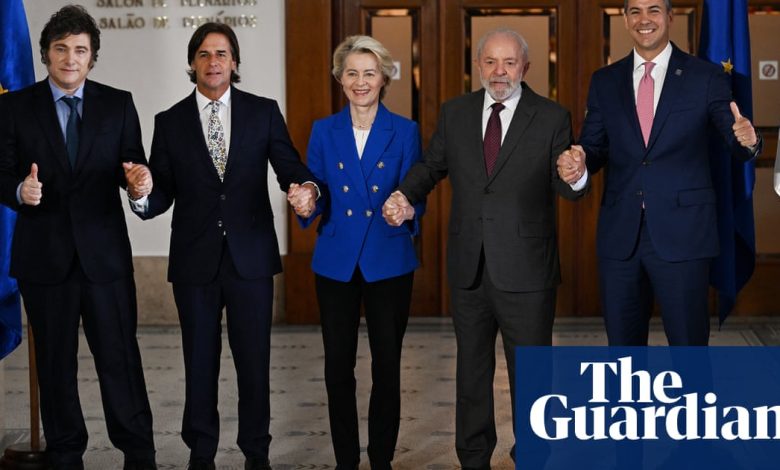EU farmers plan protests as Von der Leyen approves Mercosur trade deal | European Union

The EU executive struck a deeply controversial trade deal with four South American countries, overriding French objections and prompting an immediate call for protest from European farmers.
Ursula von der Leyen, the president of the European Commission, flew to Montevideo to sign what she called a “historic agreement” with the four founding countries of Mercosur: Argentina, Brazil, Paraguay and Uruguay.
The two trading blocs have held on-and-off talks for 25 years, but talks have intensified in the past nine months as Donald Trump’s campaign for the White House on a protectionist platform gained momentum.
Von der Leyen said the agreement was “not only an economic opportunity” but also a “political necessity” between like-minded, democratic countries.
“We both believe that openness and cooperation are the true drivers of progress and prosperity.” I know strong winds are blowing in the opposite direction towards isolation and fragmentation, but this agreement is our clear answer.
She approved the deal despite being told it was “unacceptable” by French President Emmanuel Macron, who is embroiled in a domestic political crisis.
If ratified, the deal would reduce South American tariffs on European cars, clothing, food, fine wines and medicine. In return, the EU will open its markets but has imposed restrictions on the amount of beef, pork, ethanol, honey and sugar that can be imported.
The agreement still needs to be approved by EU member states and the European Parliament, but the exact mechanisms have yet to be determined. Commission lawyers are widely expected to opt for the easier method of ratification, which does not give member states veto power.
However, ratification is not certain. French Trade Minister Sophie Primas told AFP that the latest deal “is not the end of the story”, saying that “it only involves the commission, not [EU] Member States’.
Poland joined France in opposing the deal, while officials in Italian Prime Minister Giorgia Meloni’s office said before Friday’s announcement that conditions for approving the deal had not been met.
On Friday, one of Meloni’s allies in the European Parliament, Carlo Fidanza, said there was no reason to give the green light because compensation for European producers who could lose out remained “too meager,” among other concerns.
The agreement is strongly supported by Germany and Spain, who see export opportunities and stronger diplomatic ties.
German Chancellor Olaf Scholz tweeted that an important hurdle had been cleared: “This will create a free market for more than 700 million people, along with more growth and competitiveness.”
Spanish Prime Minister Pedro Sanchez said the agreement would “create an unprecedented economic bridge between Europe and Latin America.”
The deal marks a personal victory for Brazil’s president, Luiz Inacio Lula da Silva, who had pushed hard for the deal.
But it was met with tepid enthusiasm by Argentina’s far-right libertarian Javier Millay, who has pushed for Mercosur’s rules to be loosened to allow member states to negotiate bilateral deals with other countries outside the bloc.
On Friday, Millay said the bloc had “ultimately become a prison” for member states, later saying it “brings us more problems than solutions.”
An earlier deal between the EU and Mercosur collapsed in 2019 when several European countries refused to sign due to raging fires in the Amazon rainforest as a result of aggressive land-clearing policies under Brazil’s then-far-right president Jair Bolsonaro.
EU officials said they had made significant improvements to the 2019 text: the agreement can now be suspended if countries fail to keep their promises under the Paris climate agreement. The trade agreement “respects Mercosur’s exceptional and fragile natural heritage,” von der Leyen said.
Green activists and politicians argue that climate protection is insufficient. The European Coalition for Fair Trade argued that the deal would drive deforestation and encourage “destructive farming patterns that displace small farmers and local communities”.
Laura Restrepo Alameda of the Climate Action Network Latin America said the deal would push South America “further towards ecological collapse” and support a “destructive neo-colonial economic system” leading to inequalities.
“The deal will seriously affect the collective rights of local communities who already bear a disproportionate burden of the climate crisis and were outrageously never consulted on the deal,” she said.
Copa Cogeca, the European agricultural lobby group, said it planned “swift” protests on Monday, arguing that farmers risk losing income “due to the influx of cheap products” from Mercosur countries. A representative said the agricultural sector had been used “as a bargaining chip in favor of other industries”.
EU officials objected that the deal included safeguards for sensitive products. The EU will allow the import of 99,000 tonnes of beef from Mercosur at new lower tariffs of 7.5%, phased in over five years, equivalent to 1.6% of the bloc’s annual consumption. The EU already imports nearly 200,000 tonnes of beef from the four South American countries.
The commission, which has the power to negotiate trade deals on behalf of the EU, is desperate that the Mercosur deal could fail. Officials fear the EU will lose influence and credibility in South America as China rapidly increases investment on the continent.


